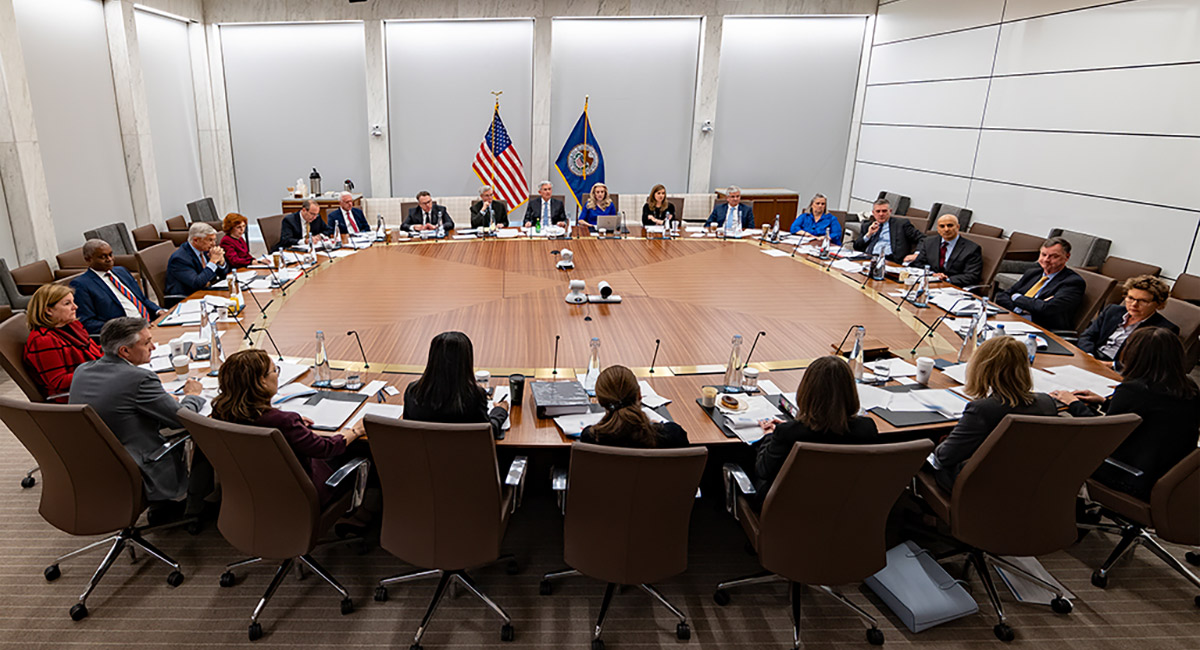Who is responsible for the value of the U.S. dollar? A cardinal rule among American practitioners of fiscal and monetary policy is that Treasury officials don’t discuss monetary policy and Federal Reserve authorities don’t discuss exchange rates. So who takes the blame—that is, which agency of government should be called on the carpet—when the currency fails to fulfill its basic functions?
As a store of value, a dollar that is losing significant purchasing power against goods and services because of inflation is failing the American people. As a unit of account, a dollar that transmits distorted price signals across borders because it is out of kilter with major foreign currencies plays havoc with international trade and investment outcomes. As a medium of exchange, a dollar that is widely accepted as a sovereign currency grants privileges, but private cryptocurrencies foreshadow a challenge.
This matters because Americans are contending with a gross domestic product price index rising at an 8% annual rate and watching their retirement savings melt away. Meanwhile, the soaring foreign-exchange value of the dollar is making U.S. exports more expensive in foreign markets; last quarter’s results showed a 1.4% shrinkage in GDP growth, the first contraction since the pandemic, as U.S. exports plunged against imports.
How can we reconcile divergent approaches for pursuing stable money in both domestic and international terms? Can we formulate a single directive aimed at safeguarding the integrity of the dollar—and who will be held accountable?
The Federal Reserve proclaims responsibility for ensuring “stable prices” in keeping with its dual mandate. As Chairman Jerome Powell acknowledged on May 4 after the latest Federal Open Market Committee meeting: “Inflation is much too high and we understand the hardship it is causing, and we’re moving expeditiously to bring it down.” The Fed’s belated solution is to kill demand by raising interest rates; unfortunately, the Fed’s blunt instrument kills supply, too, as borrowing costs rise prohibitively.
Will Congress get involved if the Fed can’t deliver price stability? Not likely. The Constitution grants Congress the power to “coin money” and “regulate the value thereof, and of foreign coin,” but the Fed’s political independence, which politicians regularly invoke, provides a virtuous pretext for refraining from criticism. This proves mutually convenient as the Fed likewise refrains from criticizing overspending by Congress or the White House.
If the Biden administration were to implement programs (such as canceling student debt) that provide consumers with additional spending power—increasing demand without a concomitant increase in supply—prices for goods and services would rise despite the Fed’s efforts to fight inflation by pummeling economic growth. Mr. Biden can always punt to the Fed as a scapegoat for not providing citizens with stable money.
What about the dollar’s stability relative to other currencies? Treasury Secretary Janet Yellen is one of the Biden administration’s key officials; as a former Fed chief, she certainly understands the connection between rising U.S. interest rates and a stronger dollar in foreign exchange markets. Ms. Yellen would hardly deem it Treasury’s fault that the dollar is surging to multidecade highs against the euro, pound and yen. Tell U.S. companies—Microsoft, Alphabet, Pfizer,McDonald’s, Apple—to complain somewhere else as revenues from overseas translate into lower dollar profits.
Many have bought into the notion that market-determined floating exchange rates are preferable to a level monetary playing field based on fixed rates. How does that square with the Fed’s practice of granting currency-swap privileges to foreign central banks—providing U.S. dollars at a fixed exchange rate for a specified time—to relieve stresses in U.S. dollar funding in overseas markets?
Speaking before the Atlantic Council in April, Ms. Yellen referenced the Bretton Woods proposals that Treasury officials began crafting in 1941. The goal then was to shape a postwar international financial architecture that would inspire struggling nations to persevere in hope of a more stable and prosperous economic future.
But even as Ms. Yellen cited the advantages of a rules-based multilateral system, she neglected to mention that the Bretton Woods system’s defining feature was its requirement that participating nations maintain a fixed exchange rate between their own currencies and a dollar convertible into gold.
When central banks buy government debt to goose economic performance, they create inflation. To cure it they must undermine productive activity and hammer financial markets. Maybe it is time to consider whether we can do better. Stable money should be seen as a right. It’s essentially a moral contract between government and its citizens. How else can people plan?
In both 2012 and 2016, the Republican platform called for a commission to “investigate ways to set a fixed value for the dollar.” Sponsored by Rep. Kevin Brady (R., Texas), the House passed legislation in 2015 to set up such a commission “to examine the United States monetary policy, evaluate alternative monetary regimes, and recommend a course for monetary policy going forward.”
A companion bill recommending a commission to evaluate how the Federal Reserve’s monetary policy has affected the performance of the economy—in output, employment, prices, and financial stability—was co-sponsored in the Senate by John Cornyn, Rand Paul and Ted Cruz. Unfortunately, it failed to pass.
Inflation wasn’t such a compelling issue then. It is now. Congress should quickly enact legislation for a monetary commission that would carefully consider how best to secure the integrity of the American currency.









